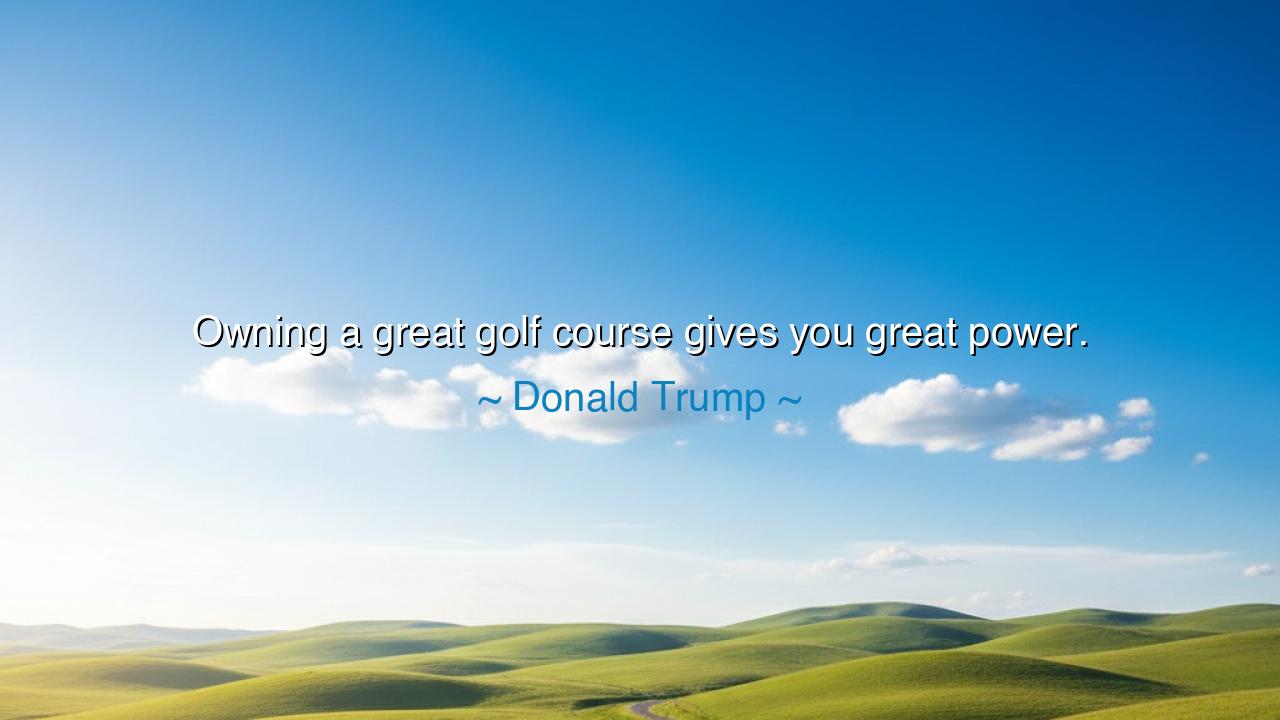
Owning a great golf course gives you great power.






“Owning a great golf course gives you great power.” Thus spoke Donald Trump, a man whose life has been defined by ambition, spectacle, and the pursuit of mastery over both land and legacy. Though on its surface this declaration may seem simple — the boast of a man of wealth — its meaning runs deeper when seen through the lens of ancient wisdom. For within these words lies a timeless reflection on ownership, influence, and the human desire to shape the world around oneself. Trump, ever the builder and showman, speaks not merely of golf, but of the nature of power itself — the power that comes from creation, from stewardship, and from commanding the admiration of others.
In its essence, this quote reveals how creation and control are intertwined. To own a great golf course — not merely a field of grass, but one shaped with vision, beauty, and purpose — is to possess mastery over a piece of the earth and to command the respect of those who enter it. The golf course, in this sense, becomes a kingdom of order amid chaos, a landscape carved from wilderness to reflect human will. It is a metaphor for all human achievement: the transformation of nature into art, of effort into prestige. When Trump speaks of power, he does not mean the tyranny of domination, but the authority of creation — the sense that those who build and shape the world wield an influence greater than wealth alone.
The origin of this statement arises from Trump’s long love affair with the world of golf — a realm where elegance and competition meet, where influence is measured not just in strokes, but in who owns the greens upon which others play. To Trump, golf was not simply a sport, but a stage of civilization, a symbol of refinement, status, and control. He built courses across continents — in Scotland, America, Ireland — each one a reflection of his vision. In doing so, he understood something that kings, emperors, and patrons of old had long known: that to own beauty is to command attention, and to shape leisure is to shape culture. Thus, in the quiet greens and rolling fairways of his courses, he found a form of soft power, the ability to draw people of influence into his domain and bend the subtle currents of prestige in his favor.
History offers many such parallels. When the Medici family of Florence built their palaces and commissioned art from Michelangelo and Botticelli, they were not merely beautifying their city — they were consolidating power. Their wealth bought stone and paint, but their vision bought loyalty, admiration, and legacy. In the same way, the rulers of ancient China built grand gardens, landscapes designed not just for pleasure, but for philosophy — symbols of cosmic balance and imperial authority. So too, Trump’s golf courses, with their manicured perfection and global recognition, serve as modern temples of influence — places where aesthetics and ambition intertwine to produce power that is not brute, but magnetic.
Yet there is another layer of meaning here, one that speaks to all who would pursue greatness. Trump’s declaration reminds us that power is born not merely from possession, but from creation. Anyone may buy land, but to shape it into something enduring requires vision and will. The “great golf course” is a metaphor for any human endeavor brought to excellence — a business, a craft, a work of art. Those who devote themselves to mastery in their chosen field, who cultivate it with care and purpose, gain a power that transcends wealth. It is the power of the creator, the builder, the dreamer who leaves behind something that bears his name long after he is gone.
But with this power comes a moral question — for ownership can elevate, or it can corrupt. To own something great is to bear responsibility for it, to ensure that it serves not vanity alone, but vision. The wise ruler does not build monuments only to himself, but to the greater harmony of his time. Trump’s words, though born in the context of business and sport, echo a truth known to emperors and philosophers alike: the measure of one’s greatness lies not in what one owns, but in what one shapes with purpose and integrity.
So, my children, hear this lesson: whatever your “golf course” may be — your craft, your enterprise, your dream — build it with care, and build it greatly. Seek not power for its own sake, but for the good that can arise from your creation. For to shape a thing with excellence is to hold a kind of dominion — over chaos, over mediocrity, over the fleeting nature of time. Let your “ownership” be not of land or title alone, but of vision, discipline, and mastery.
And remember this: the great power that comes from creation is not in the domination of others, but in the inspiration it awakens. The garden, the temple, the golf course, the work of art — these are all symbols of humanity’s divine inheritance, the ability to bring order and beauty into being. When you build something that endures, you hold in your hands a power far greater than wealth — the power to influence, to uplift, and to be remembered. So yes, every man and woman who creates their “great course” upon the field of life gains great power. But only the wise will use it to make the world itself a little more perfect than it was before.






AAdministratorAdministrator
Welcome, honored guests. Please leave a comment, we will respond soon